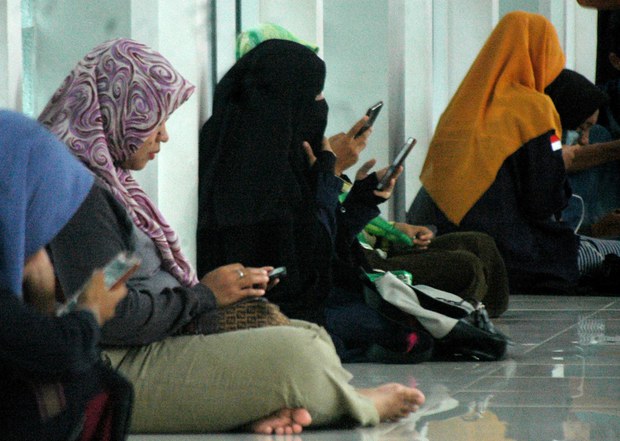Indonesia: Salafist Views Grow at Public Universities, Study Finds
2019.06.03
Jakarta
 Muslim students check their mobile phones at a university in Yogyakarta, Indonesia, March 7, 2018.
Muslim students check their mobile phones at a university in Yogyakarta, Indonesia, March 7, 2018.
Religious activities influenced by Salafism and support for establishing a state ruled by Sharia law have strengthened among Muslim students at state-run universities in Indonesia, according to a new study by a local research institute.
That Islam is under attack is a dominant discourse in religious studies on campuses, with an Islamic state or the imposition of Islamic law being offered as a solution, according to the report by the Setara Institute for Democracy and Peace, issued Friday.
“At various public universities, exclusive ideas and movements such as Salafism-Wahhabism, Tarbiyah and Tahririyah are still growing,” said the report.
Salafism is a Sunni Muslim movement that embraces a literal interpretation of the Quran and a return to the traditions of the era of the Prophet Muhammad. The official “Wahhabi” religion of Saudi Arabia is based on certain segments of Salafism, and reports have claimed that Wahhabism has fueled global extremism and contributed to terrorism.
“This situation could potentially be a threat to Pancasila, democracy and the Unitary State of Indonesia,” Setara said.
Indonesia, the world’s most populous Muslim nation, is a secular state with religious minorities, linguistic and cultural diversity and a state ideology that touts pluralism.
Tarbiyah is a movement inspired by the Muslim Brotherhood, a transnational Sunni organization founded in Egypt a century ago that seeks to implement Sharia law under a global caliphate.
Tahririyah refers to the teachings of Hizb ut Tahrir, a pan-Islamic political organization that advocates the establishment of an Islamic caliphate. The government banned its Indonesian branch, Hizbut Tahrir Indonesia (HTI), in 2017, as a threat to the nation’s unity and pluralism.
“The dissolution of HTI didn’t kill the ideas, which are still spreading. There was a lull after the disbandment, but there’s an underground movement,” said Halili, the research director at Setara, who goes by one name.
Activists influenced by its ideas are seeking to dominate student government on campus, according to the Setara report. “As a result, campus environments tend to be exclusive, averse to non-Muslim leadership of student organizations, or even Muslims who are outside their groups,” it said.
Alarmist
Asep Saifudin, a member of the Indonesian Association of University Rectors, said the study did not reflect the views of the majority of students at universities.
“Having said that, we need to see to it that student [organizations] are open about their activities and conduct dialogue with moderate religious scholars so they can widen their religious horizons,” he told BenarNews on Monday.
Meanwhile, Nurhaidi Hasan, a researcher at the state-run Sunan Kalijaga Islamic University, called the report alarmist.
“What’s happening is the phenomenon of post-Islamism. Yes, there’s a bit of Muslim Brotherhood ideology, but it’s been diluted,” said Nurhaidi, who conducted a 2017 study on millennial Muslim students.
“Students don’t read books by Hasan al-Banna or Sayyid Qutb anymore,” he said, referring to Muslim Brotherhood leaders. “They read books by popular Indonesian preachers such as Felix Siauw that deal more with day-to-day problems of young Muslims,” he told BenarNews.
Felix Sauw, 35, is a former ethnic Chinese Catholic who converted to Islam and became an Islamic preacher. He has written self-help books including “How to Master Your Habits” and “Just Break Up.”
Intolerance is a serious issue in Indonesia and not just limited to public universities, Nurhaidi said.
“The government’s lack of resolve against intolerance targeting minorities is also part of the problem,” he said.
Conservative Muslims
Mohammad Hasan Ansori, an analyst on counter-terrorism at the Habibie Center think tank, cautioned against painting student Muslim activists with one brush.
“Religious study groups such as Tarbiyah are mostly conservative and puritan, but they aren’t radical,” he told BenarNews on Monday. “They are not opposed to democracy but want Islam to be part of it.”
He estimated that less than 1 percent of Muslims students were in the radical category – meaning people who could be convinced to use violence to impose their ideology on others, or who reject democracy and the concept of a secular state.
“But being conservative is one step to being radical as the environment is conducive to radicalism,” he said.
Last year, the National Intelligence Agency (BIN) said its own 2017 survey showed that about 39 percent of Indonesian university students had been exposed to radical Islamic ideology.
Many respondents at state and private universities in 15 provinces indicated they would support making Indonesia an Islamic state and expressed support for the IS, according to BIN.
The figures are consistent with findings of the Jakarta-based Alvara Research Center and Mata Air Foundation in October 2017. The groups polled 1,800 students from 25 leading universities in Indonesia and 2,400 students from high schools across Java and other islands.
The Alvara survey revealed that 17.8 percent of university students and 18.3 percent of high school students preferred the concept of a caliphate ruled by a Muslim spiritual leader over Indonesia’s current republic.
Reduction of influence
The Bogor Institute of Agriculture (IPB), named by the National Counterterrorism Agency as one of seven campuses where students are at risk of being exposed to radicalism, recently managed to reduce the Islamists’ influence. The school confined all religious activities to the campus mosque and promoted activities of diverse religious groups, including non-Muslim ones.
“They are all given facilities and protection, which is unprecedented in the history of IPB,” Cahyono, an IPB researcher said at the Setara report’s launch.
“Things are changing at IPB. It (the Islamist influence) was massive before. They could even disband a cultural event because they saw it as immoral,” he said.
Other public colleges including Gadjah Mada University and the University of Indonesia are having some success in limiting Islamist influence, Halili said.







